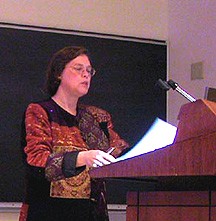
Speaker exposes sex trafficking
Donna M. Hughes presented her Transnational Political Criminal Nexus of Trafficking in Women and Children lecture in SMU’s McCord Auditorium Tuesday.
The lecture discussed how the trafficking of women and children became the third leading moneymaker next to drugs and arms dealing in the United States, bringing in $7-12 million a year nationally. The number of trafficked women and children is difficult to measure, Hughes explained.
“The trade is secretive, the women are silenced, the traffickers are dangerous, and not many agencies are counting,” she said.
A recent figure from the United Nations estimates 700,000 to 2 million women are trafficked worldwide.
“I think this is an issue that not many people know about, and when they find out about it it’s still hard to believe,” said University Honors Program Coordinator April Andreas.
Rather than blaming the socio-economic status of the sending country, Hughes believes the process of trafficking begins with the demand for women or when pimps “place orders” with traffickers. Women are often recruited through advertisements for low-skilled jobs like waitresses, dancers or hostesses, travel agencies, modeling opportunities and marriage agencies.
Another common way for women to be recruited is through a “lover boy” – someone who befriends the woman and then turns her over to a pimp. Women who were previously trafficked are also known to recruit new victims, known as second-wave recruitment.
The women are either smuggled across the border or pimps work with corrupt officials to get authentic travel documents. Once inside, they are held in captivity and threatened with violence, confinement, debt bondage and blackmail using photography or threats to their family. The receiving countries often treat the victims as criminals or illegal immigrants and offer little sympathy and social services.
Hughes said women and children are also heavily used in the pornography industry. She cited Budapest, Hungary as a center for pornography production because “there, it costs less and they do more.”
Despite periodic agency funding to increase the awareness of trafficking and offer victims assistance, little has been done internationally and domestically to address the issue.
Hughes proposes that in order to end the trafficking of women and children, the sending and receiving countries will have to work together on countering their portions in the transnational political criminal nexus of trafficking. She takes an abolitionist approach to solving the issue, saying regulation alone will not help the “human rights struggle of our time.”
Hughes’ work and long-time focus in the area of trafficking is fueled by her strong belief that women and children are entitled basic human rights and dignity.
“If we want to end it we have to have a vision of where we are going,” she said. “We have to be able to imagine the world we want.”








